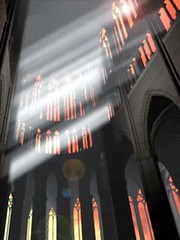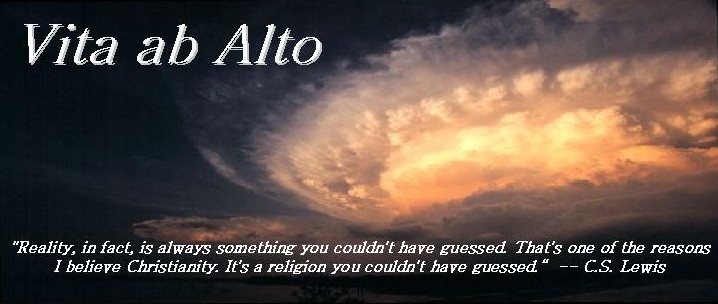Christian Carnival LXXIV

This week's Christian Carnival is up at DaddyPundit. Lots of rich, faithful mind-loam there, including my conversation with Joe of Deo Omnis Gloria concerning moral ralativism.
There's also this very thoughtful response to a "14-year-old creationist (and proud of it)" from a self-proclaimed "skeptic" on all subjects over at Respectful Insolence. He makes several points that Christians with an interest in the sciences or creationism would do well to remember:
...You seem to be trying to think for yourself, even if the conclusions you're coming up with aren't scientifically correct, perhaps you'd like to contemplate the relationship between religion and science, specifically the science of evolution. One self-described "Bible-thumpin'" minister recently commented on my blog:
Those who use the Bible to disprove evolution obviously do not understand how to read and interpret scripture. The Bible is not a book about the "how" of creation, but of the "who" of creation. Leave the "how" to the scientists and the "who" to the Bible.
To me, this sounds like very reasonable advice. In addition, many other highly religious people have decided that there is no inherent conflict between their belief in God and accepting the theory of evolution. These clergy, for example. Even the highly conservative late Pope John Paul II stated that evolution is not incompatible with Catholicism. Similarly, although it is a common misconception even among Mormons that Mormonism mandates belief in creationism, there is no such requirement in the Mormon religion. As has been pointed out here:
Science can never prove nor disprove the existence of a God. The argument is circular. If a higher power created the universe and established its rules, it could choose to remain forever anonymous.
True, as far as it goes. "Blessed are those who have not seen and yet believe."
We Christians need to keep this in mind in our enthusiasm to refute modern materialist philosophy. Science should be a neutral observer, if it's "done right." We are right to criticize those who have made certain tenets or theories of modern science religions unto themselves--the approach taken by the likes of Carl Sagan and Stephen Jay Gould, for example--but should remember that no archeological confirmation of the New Testament's account or discovery of holes in the Darwinian evolutionary mechanism can prove or disprove the Lord's claims about himself. We are always left to view as through a glass darkly in this life.
Having written that, I do not subscribe to the idea of separate-but-equal magisteria that Gould introduced and Orac seems to endorse in his post--that scientists should do science and religionists do religion and never the twain should meet. Our God (that is always to say, THE God) is a God who manifested himself in space and time (and who left the best record of that manifestation of any event in the ancient world, BTW) and who gave us reason as a tool to help proclaim Him, just as He gave us a yearning for Him (inclining some of us--most of us?--to put things easier to understand and control in the "yearning place"). I believe, however, that "evolution" and adaptation are pervasive parts of God's nature and reveal significant things about His mind. I will blog at length on this topic soon. I also believe that Orac ultimately implies what's right: to establish the truths of God's nature, we must go beyond mere reason.
Monk



